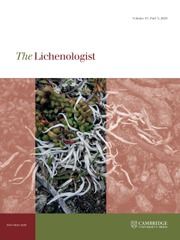Article contents
A revision of the species of the Rhizocarpon hochstetteri group occurring in the British Isles
Published online by Cambridge University Press: 28 March 2007
Abstract
Rhizocarpon hochstetteri s. str. is shown to be an upland/montane species with relatively large ascospores. The name Rhizocarpon infernulum is resurrected for the species with smaller ascospores previously included within R. hochstetteri, but which is probably more closely related to R. cinereovirens. Lectotypes are chosen for a number of taxa, including R. cinereovirens and R. infernulum, and descriptions provided for two new taxa with small hyaline, 1–septate ascospores: R. caesium, which occurs on damp, mildly basic rocks in oceanic areas, and R. infernulum f. sylvaticum occurring on siliceous rocks in damp deciduous woodlands. All these taxa are known also from North America. Rhizocarpon discoense is shown to be a distinct species, not a synonym of R. cinereovirens. The different ascospore dimensions reported for R. hochstetteri by British and European authors are shown to be due to confusion between R. hochstetteri and R. polycarpum. A number of morphological characters are evaluated regarding their relevance to species separation in Rhizocarpon and the name Macrocarpa-green is proposed for the olivaceous pigment present in most species of Rhizocarpon and Porpidia. A key is provided for the species of Rhizocarpon with hyaline, 1– septate ascospores.
- Type
- Research Article
- Information
- Copyright
- Copyright © British Lichen Society 2002
- 13
- Cited by


